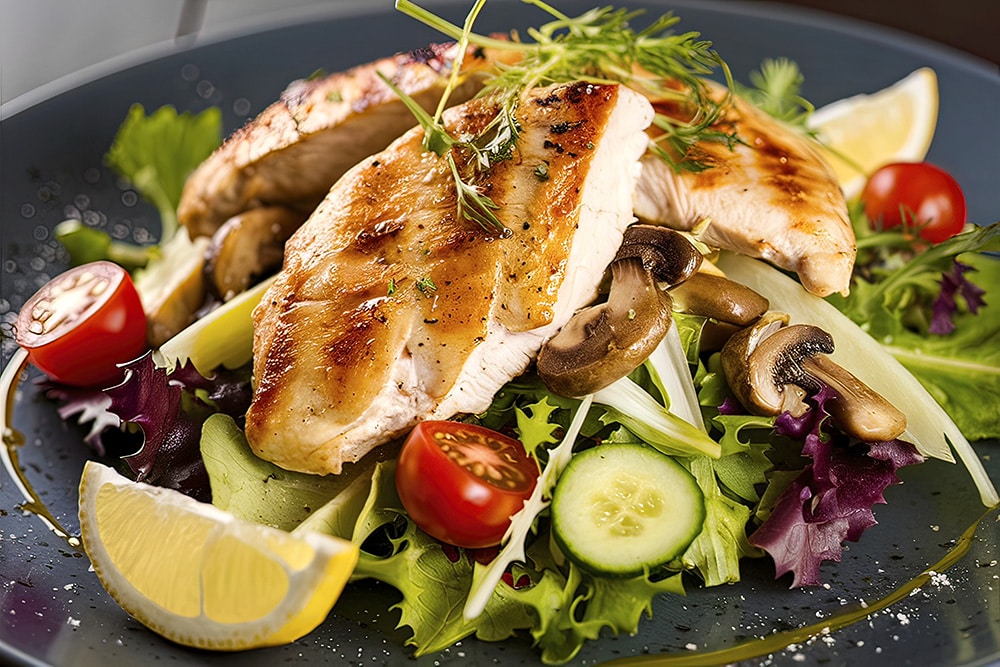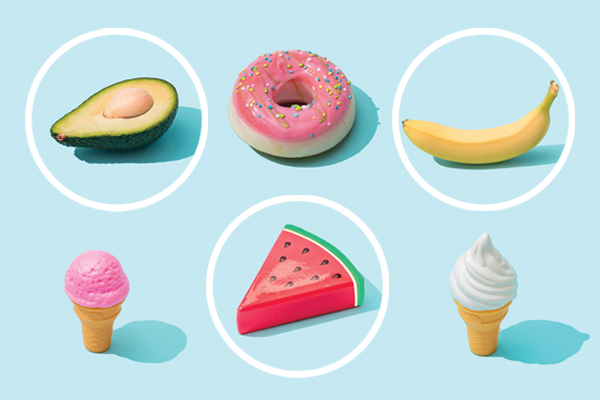Losing weight can be a challenge for anyone, no matter what their goals are. However, that’s usually because attempts to lose weight leave us feeling hungry as we eat less and can’t get used to the reduced calorie diet.
Fad diets that have us only drinking milkshakes and eating salad leaves are unsustainable and boring, and mean that the average person is likely to try (and fail) 126 fad diets throughout their lifetimes. But what if there was another way?
Volume eating is the secret to eating less food while still feeling satisfied, full, and with plenty of energy to take on the day. Whether you’re on a medically supported weight loss journey, or just looking to cut down your calories and get healthier, this guide to losing weight while eating more is just what you need.
Andy McGlynn, Bodyline’s Clinical Nutrition and Diagnostic Nutrition Consultant says,
“Weight loss doesn’t have to mean deprivation and constant hunger. By choosing high-volume, low-calorie foods and being mindful of your overall calorie intake, you can create a calorie deficit while feeling satisfied and nourished. At Bodyline, we’ve helped over 100,000 people find what works for them, we can support you so that you benefit from the synergy between the medical and holistic pathways.”
Contact Bodyline today to find out more about our safe and effective weight loss programmes and range of treatment options.
The Basics of Calorie Deficits
Before we dive into volume eating, it’s important to understand the basics of weight loss: calorie deficits.
Simply put, a calorie deficit occurs when you consume fewer calories than your body needs to maintain its current weight. This deficit forces your body to tap into stored fat for energy, resulting in weight loss.
While traditional diets often focus on reducing portion sizes to create a calorie deficit, volume eating takes a different approach.
What is Volume Eating?
Volume eating is a strategy that focuses on consuming larger quantities of low-calorie foods to create a feeling of fullness and satisfaction while still maintaining a calorie deficit. Choosing to eat more low-calorie foods has been linked to successful weight loss in a review of 13 studies and researchers have found it is likely to curb cravings and prevent snacking.
The idea is to choose foods that are high in volume but low in calories, allowing you to eat more without consuming excessive calories. By incorporating these foods into your meals and snacks, you can increase the overall volume of your food while reducing the calorie density.
You’ll feel full, be less likely to snack, and feel more satisfied, making you more likely to stick to the diet, sustain the calorie deficit, and thus tap into fat stores and lose weight! With the concept of volume eating, you can lose weight while actually eating more!
The Best High-Volume Foods to Enjoy
When it comes to volume eating, not all foods are created equal. To maximize the volume of your meals without adding excessive calories, focus on incorporating the following high-volume foods into big salads, bowl foods, and picky plates:
Vegetables: Packed with fibre and water, vegetables are a volume eater’s best friend. Go for non-starchy vegetables like broccoli, spinach, kale, cauliflower, and bell peppers. These veggies are low in calories but high in nutrients, making them an excellent choice for increasing meal volume.
Fruits: Like vegetables, fruits are high in fibre and water content. Apples, berries, watermelon, and citrus fruits are particularly filling while also low in calories. Try to include a variety of fruits in your diet to benefit from their nutritional value.
Lean Proteins: Protein is known for its filling effects, and incorporating lean protein sources into your meals can help increase volume while providing nutrients essential for your health. Try going for chicken breast, turkey, fish, tofu, or legumes to add protein without excessive calories, and season them with your favourite flavours to make it extra tasty: teriyaki or Cajun rubs are always popular!
Whole Grains: Whole grains like quinoa, brown rice, and oats are not only nutritious but also add bulk to your meals. They provide a satisfying texture and can contribute to a feeling of fullness, allowing you to eat more while still maintaining a calorie deficit.
Low-Fat High Protein Dairy: If you enjoy dairy products, go for low-fat options such as Greek yogurt or cottage cheese. These provide a good source of protein while keeping the calorie content in check. Protein is proven to make you feel fuller while offering more energy, certain to help with weight loss.
Broth-Based Soups: Soups with a broth base, such as vegetable or chicken broth, can be incredibly filling while keeping the calorie count low. They provide a high volume of liquid, which contributes to a sense of fullness without adding excessive calories.
Which Foods to Avoid when Volume Eating
While volume eating encourages you to eat more, there are still certain foods you should limit or avoid maintaining a calorie deficit. These include:
Highly Processed Foods: Processed foods tend to be high in calories and low in volume. They often contain added sugars, unhealthy fats, and artificial ingredients that can hinder your weight loss efforts. Avoid or minimize items like sugary snacks, fried foods, and processed meats.
Calorie-Dense Beverages: Beverages like soda, sugary juices, and alcoholic drinks can pack a significant number of calories without providing much volume. Go for calorie-free options like flavoured water, unsweetened tea, or sparkling water to stay hydrated without adding unnecessary calories.
Added Fats and Oils: While healthy fats are an important part of a balanced diet, they are also calorie dense. When volume eating, be mindful of added fats and oils used in cooking or as dressings. Use them sparingly to keep calorie counts in check.
Top Tips for Volume Eating Weight Loss Success
Now that you understand the basics of volume eating, here are some top tips to help you succeed on your weight loss journey:
- Plan and Prep Meals: Plan your meals in advance and incorporate high-volume foods into your recipes. Prepping meals ahead of time can help you stay on track and make healthier choices when hunger strikes. Planning meals has also been linked to better diet and makes you less likely to be obese according to a large study in 2017.
- Bulk Up with Vegetables: Fill your plate with non-starchy vegetables to add volume and nutrients to your meals. Experiment with different cooking methods and seasonings to make them more enjoyable and find your favourites!
- Stay Hydrated: Drink plenty of water throughout the day to stay hydrated and promote a feeling of fullness. Sometimes, thirst can be mistaken for hunger, leading to unnecessary snacking. We always advise 2-3 litres of water every day.
- Slow Down and Savor: Eating slowly and mindfully can enhance your eating experience and allow your brain to register feelings of fullness. Put your fork down between bites, chew thoroughly, and savour each mouthful.
- Prioritise Protein and Fibre: Incorporate lean proteins and fibre-rich foods into your meals to promote satiety and keep you feeling full for longer. These nutrients can help prevent overeating and unnecessary snacking.
- Listen to Your Body: Pay attention to your body’s hunger and fullness cues. Eat when you’re hungry, and stop when you’re satisfied, even if there’s food left on your plate.
- Be Mindful of Liquid Calories: Be mindful of the calories in beverages, as they can add up quickly. Go for calorie-free or low-calorie options to save your calories for high-volume foods.
- Experiment with Recipes: Get creative in the kitchen and explore new recipes that incorporate high-volume ingredients. There are plenty of resources online for volume eating recipes that are both delicious and satisfying. Have fun with it!
Incorporate these volume eating strategies into your daily routine and watch as you achieve your weight loss goals without sacrificing enjoyment or satiety.
If you’re struggling to lose weight with diet and exercise alone, you may benefit from incorporating volume eating into a scientifically backed medical weight loss programme with Bodyline Clinic. We prescribe medications guaranteed to aid in weight loss and provide tips and tricks to change your lifestyle and build healthy habits for the future.
Get in touch today to find out how we can help by filling in a contact form or calling 0800 995 6036.















